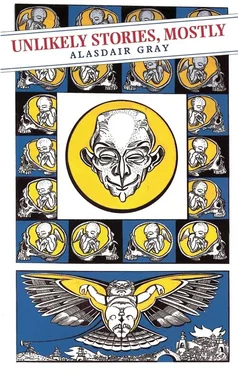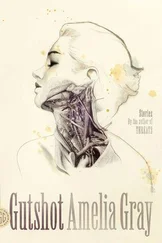After a while I heard your voices talking quietly together and thought you had been allowed to visit me at last, but when I joined the conversation I found we were talking of things I must have heard discussed when I was a few months old. It was very interesting. I learned later that other students imagined the voices and company of ghouls and madmen and gulped down the water so fast that they became ill. I sipped mine as slowly as possible. The worst person I met was the corpse of the dead boy I had helped father take from the canal. I knew him by the smell. He lay a long time in the corner of the room before I thought of welcoming him and asking his name. He told me he was not an ill-treated orphan, as father had thought, but the son of a rich waterworks inspector who had seen a servant stealing food and been murdered to stop him telling people. He told me many things about life among the highest kinds of honoured-guest-class, things I could never have learned from my teachers at the academy who belonged to the lower kind. The imagination lessons became, for me, a way of escaping from the drum, chess and recitation masters and of meeting in darkness everyone I had lost with infancy. The characters of classical literature started visiting me too, from the celestial monkey who is our ancestor to emperor Hyun who burned all the unnecessary books and built the great wall to keep out unnecessary people. They taught me things about themselves which classical literature does not mention. Emperor Hyun, for instance, was in some ways a petty, garrulous old man much troubled with arthritis. The best part of him was exactly like my father patiently dredging for good things in the sewage mud of the north-west slums. And the imperious seductive white demon in the comic creation myth turned out to be very like my aunt, the courtesan, who also transformed herself into different characters to interest strangers, yet all the time was determinedly herself. My aunt visited me more than was proper and eventually I imagined something impossible with her and my academic gown was badly stained. This was noted by the school laundry. The next day the medical inspector made small wounds at the top of my thighs which never quite healed and are still treated twice a month. I have never since soiled cloth in that way. My fifth limb sometimes stiffens under Adoda’s caresses but nothing comes from it.
Soon after the operation the headmaster of literature visited the academy. He was a heavy man, as heavy as I am now. He said, “You spend more days imagining than the other scholars, yet your health is good. What guests come to your dark room?”
I told him. He asked detailed questions. I took several days to describe everyone. When I stopped he was silent a while then said, “Do you understand why you have been trained like this?”
I said I did not.
He said, “A poet needs an adventurous, sensuous infancy to enlarge his appetites. But large appetites must be given a single direction or they will produce a mere healthy human being. So the rich infancy must be followed by a childhood of instruction which starves the senses, especially of love. The child is thus forced to struggle for love in the only place he can experience it, which is memory, and the only place he can practise it, which is imagination. This education, which I devised, destroys the minds it does not enlarge. You are my first success. Stand up.”
I did, and he stooped, with difficulty, and tied the dark green ribbons round my knees. I said, “Am I a poet now?”
He said, “Yes. You are now the emperor’s honoured guest and tragic poet, the only modern author whose work will be added to the classics of world literature.” I asked when I could start writing. He said, “Not for a long time. Only the emperor can supply a theme equal to your talent and he is not ready to do so. But the waiting will be made easy. The days of the coarse robe, dull teachers and dark room are over. You will live in the palace.”
I asked him if I could see my parents first. He said, “No. Honoured guests only speak to inferior classes when asking for useful knowledge and your parents are no use to you now. They have changed. Perhaps your small pretty mother has become a brazen harlot like her sister, your strong silent father an arthritic old bore like the emperor Hyun. After meeting them you would feel sad and wise and want to write ordinary poems about the passage of time and fallen petals drifting down the stream. Your talent must be preserved for a greater theme than that.”
I asked if I would have friends at the palace. He said, “You will have two. My system has produced one other poet, not very good, who may perhaps be capable of some second-rate doggerel when the order-to-write comes. He will share your apartment. But your best friend knows you already. Here is his face.”
He gave me a button as broad as my thumb with a small round hairless head enamelled on it. The eyes were black slits between complicated wrinkles; the sunk mouth seemed to have no teeth but was curved in a surprisingly sweet sly smile. I knew this must be the immortal emperor. I asked if he was blind.
“Necessarily so. This is the hundred-and-second year of his reign and all sights are useless knowledge to him now. But his hearing is remarkably acute.”
So I and Tohu moved to the palace of the old capital and a highly trained entourage distracted my enlarged mind from the work it was waiting to do. We were happy but cramped. The palace staff kept increasing until many honoured guests had to be housed in the city outside, which took away homes from the citizens. No new houses could be built because all the skill and materials in the empire were employed on the new palace upriver, so all gardens and graveyards and even several streets were covered with tents, barrels and packing-cases where thousands of families were living. I never used the streets myself because honoured guests there were often looked at very rudely, with glances of concealed dislike. The emperor arranged for the soles of our ceremonial clogs to be thickened until even the lowest of his honoured guests could pass through a crowd of common citizens without meeting them face-to-face. But after that some from the palace were jostled by criminals too far beneath them to identify, so it was ordered that honoured guests should be led everywhere by a janitor and surrounded by their entourage. This made us perfectly safe, but movement through the densely packed streets became very difficult. At last the emperor barred common citizens from the streets during the main business hours and things improved.
Yet these same citizens who glared and jostled and grumbled at us were terrified of us going away! Their trades and professions depended on the court; without it most of them would become unnecessary people. The emperor received anonymous letters saying that if he tried to leave, his wharves and barges would catch fire and the sewage ditches would be diverted into the palace reservoir. You may wonder how your son, a secluded poet, came to know these things. Well, the headmaster of civil peace sometimes asked me to improve the wording of rumours authorized by the emperor, while Tohu improved the unauthorized ones that were broadcast by the beggars’ association. We both put out a story that citizens who worked hard and did not grumble would be employed as servants in the new palace. This was true, but not as true as people hoped. The anonymous letters stopped and instead the emperor received signed petitions from the workingmen’s clubs explaining how long and well they had served him and asking to go on doing it. Each signatory was sent a written reply with the emperor’s seal saying that his request had been heard and respected. In the end the court departed upriver quietly, in small groups, accompanied by the workingmen’s leaders. But the mass of new palace servants come from more docile cities than the old capital. It is nice to be in a safe home with nobody to frighten us.
Читать дальше












